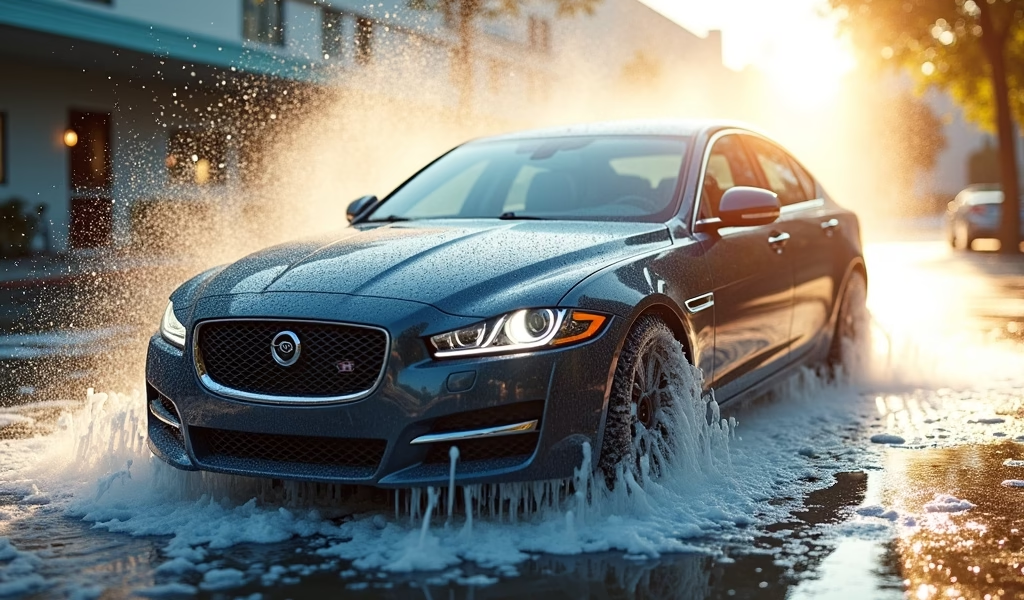Overview
This article outlines effective car washing strategies specifically tailored for Fresno’s harsh environment, addressing challenges like agricultural dust, extreme heat, and hard water through proper facility selection, optimal washing frequency, protective treatments, and water conservation methods. It emphasizes that in Fresno’s unique climate, regular car washing isn’t merely aesthetic but essential maintenance that protects vehicles from accelerated damage while preserving their value.
Table of Contents
- Introduction
- Why Fresno Requires Special Car Washing Consideration
- Choosing the Right Car Wash Facility
- Optimal Washing Frequency for Fresno Vehicles
- Professional vs. DIY Washing
- Protecting Your Car Between Washes
- Interior Cleaning Strategies
- Water Conservation While Maintaining Cleanliness
- Conclusion
- Local Resources
- Frequently Asked Questions
Introduction
Here in Fresno, keeping your car clean isn’t just about pride—it’s essential maintenance. Our Central Valley presents unique challenges that can quickly transform your shiny ride into a dusty disappointment.
As a mechanic who’s spent 20 years in this region, I’ve seen firsthand how our extreme heat, agricultural dust, and hard water wreak havoc on vehicles. The good news? With the right approach, your car can stay spotless despite everything Fresno throws at it.
I’ve compiled these six proven tips after years of helping local drivers maintain their vehicles through our harshest conditions. From choosing the best car wash methods to protecting your investment between cleanings, this guide addresses the specific challenges we face in the Central Valley.
Why Fresno Requires Special Car Washing Consideration
Fresno’s climate creates a perfect storm of car-cleaning challenges that folks in coastal areas simply don’t face. Let me break down what makes our situation unique:
Triple-digit summer temperatures don’t just make your steering wheel too hot to touch—they actually accelerate damage. Heat bakes contaminants onto your paint, transforming what would be easy-to-remove dust in milder climates into stubborn, bonded particles that can permanently mar your finish.
Living in the agricultural heartland means your vehicle is constantly bombarded with a unique cocktail of dust, pollen, pesticide residue, and farming byproducts. This isn’t your average urban grime—it’s potentially corrosive material that demands prompt removal.
Then there’s our water. Fresno’s mineral-rich supply leaves behind those frustrating water spots that, when baked under our relentless sun, can actually etch into your clear coat. What begins as a cosmetic annoyance becomes permanent damage requiring professional correction.
According to a study on urban vehicle pollution, cars in agricultural regions with high heat face significantly accelerated paint degradation compared to identical vehicles in coastal areas. It’s not just your imagination—your car really does get dirtier faster here.

Choosing the Right Car Wash Facility
Finding the best Fresno car wash requires looking beyond fancy lights and cheap promotional deals. After testing dozens of local options, I’ve identified key features that separate the truly effective facilities from the disappointing ones.
First, look for places that pre-rinse vehicles before the main wash. This crucial step removes abrasive particles that could otherwise scratch your paint during the washing process. You’ll notice better facilities have dedicated pre-rinse arches before you even reach the main wash tunnel.
Water filtration makes an enormous difference in Fresno. Top facilities invest in reverse osmosis or water softening systems for their final rinses, dramatically reducing those frustrating hard water spots that haunt Central Valley vehicles.
In my professional assessment, these Fresno facilities consistently deliver superior results:
- Quick Quack Car Wash (Blackstone Avenue) – Excellent filtration systems and consistent quality
- Surf Thru Express (Shaw Avenue) – Outstanding pre-rinse protocol and attention to undercarriage
- Red Carpet Car Wash – Superior hand finishing and spot-free rinse technology
The touchless versus brush debate deserves special consideration in our region. While touchless systems eliminate potential scratch risks, they struggle with our agricultural residue. Quality brush systems with well-maintained materials generally provide better results for most Fresno vehicles, especially when paired with proper pre-rinsing.
Remember: the cheapest option rarely delivers the protection your vehicle needs in our harsh environment. Investing a few extra dollars in a quality wash saves you significantly in the long run by preserving your paint against Fresno’s unique challenges.
Optimal Washing Frequency for Fresno Vehicles
How often should you wash your car in Fresno? This depends entirely on the season and your typical parking situation.
During summer months (June-September), weekly washing is practically mandatory, especially if your vehicle parks outside. This prevents heat-activated bonding of contaminants to your paint surface. Miss a few weeks during triple-digit temperatures, and you’ll notice the difference immediately—some contaminants will become nearly impossible to remove without professional help.
Harvest seasons intensify these needs. If you live within a few miles of active farming operations, you might need to increase to twice weekly washing during peak agricultural activity. The fine dust generated during these periods is particularly insidious and can infiltrate every surface of your vehicle.
Winter months (November-February) offer some reprieve, allowing a more manageable bi-weekly schedule. However, you should promptly wash after any fog or rain event. Contrary to popular belief, our Central Valley precipitation doesn’t clean your car—it actually deposits concentrated pollutants that can damage your finish.
My professional recommendation: set a regular washing schedule based on season, but be flexible enough to respond to conditions. After dust storms, heavy farm equipment operation nearby, or unexpected weather events, add an extra wash to your routine. Your vehicle’s longevity depends on this adaptability.
Professional vs. DIY Washing
The decision between professional and DIY washing takes on special importance in Fresno’s challenging environment. Let’s compare the approaches objectively:
From a cost perspective, commercial car washes initially appear more expensive ($10-20 per wash versus roughly $5 in home supplies per wash). However, when you factor in Fresno’s water costs, potential drought restriction fines, and the specialized products needed to address our unique contaminants, the economics shift considerably.
Quality comparison reveals interesting tradeoffs. Professional facilities offer consistent results and equipment specifically designed to address hard water minerals. Their high-pressure systems excel at removing stubborn agricultural dust. However, a meticulous DIY approach allows for greater attention to problem areas and immediate treatment of water spots.
Environmental considerations might be the deciding factor for many Fresno residents. Commercial facilities typically use 35-45 gallons per vehicle compared to 80-140 gallons for a typical driveway wash. During our frequent drought conditions, this water savings becomes significant.
If you do choose the DIY route, I strongly recommend investing in a pressure washer with foam cannon attachment and purchasing dedicated hard water spot removers. Standard car wash products from big box stores often prove inadequate against Fresno’s specific challenges.
My professional recommendation leans toward using quality commercial facilities for regular maintenance washing, supplemented with occasional detailed DIY sessions for special attention to trouble spots. This balanced approach offers the best protection while respecting our region’s water conservation needs.

Protecting Your Car Between Washes
In Fresno’s harsh environment, what happens between washes largely determines your vehicle’s long-term condition. These protection strategies make an enormous difference:
Ceramic-infused spray products have revolutionized between-wash protection. Products like Turtle Wax Hybrid Solutions or Meguiar’s Hybrid Ceramic Wax create a hydrophobic barrier that actively repels dust and contaminants. Apply these every 2-3 washes for maximum protection.
Quick detailing sprays are worth their weight in gold for Fresno drivers. Keep one in your trunk for immediate removal of bird droppings, tree sap, or insect remains. These contaminants can etch into your paint within hours during our summer heat, so prompt removal is critical.
Where you park matters tremendously. Covered parking reduces both sun damage and dust accumulation. If home garage space isn’t available, consider fabric carports or seek covered parking at work. Even partial protection makes a significant difference in maintenance requirements.
For those parking outdoors, a quality car cover designed for high-heat environments provides substantial protection. Look for covers with UV-resistant and breathable fabric specifically rated for temperatures exceeding 100°F.
My professional recommendation: Layer your protection strategy. Use ceramic spray technology after washes, keep quick detailer handy for spot treatments, and maximize covered parking whenever possible. This multi-faceted approach provides the best defense against Fresno’s challenging conditions.
Interior Cleaning Strategies
While exterior challenges may dominate our attention, Fresno’s climate is equally harsh on vehicle interiors. Proper interior maintenance requires addressing our unique conditions:
Extreme heat accelerates aging of interior surfaces, with dashboard temperatures routinely exceeding 150°F during summer. This leads to faster fading, cracking, and deterioration than you’d experience in coastal areas.
For leather surfaces, UV-protective conditioners are essential quarterly treatments. Products like Lexol Leather Conditioner or Chemical Guys Leather Serum prevent the hardening and cracking that Fresno heat accelerates.
Vinyl and plastic surfaces benefit from protective treatments containing UV blockers. 303 Aerospace Protectant creates a barrier against the fading and brittleness common in our sun-drenched vehicles. Apply this to dashboards, door panels, and trim pieces monthly during summer.
Our agricultural dust infiltrates interiors with remarkable efficiency. Use microfiber cloths slightly dampened with interior detailer rather than dry dusting, which can scratch sensitive surfaces. For fabric upholstery, apply quality fabric protectant seasonally to create a barrier against staining.
Window tinting represents perhaps the most effective interior preservation investment for Fresno vehicles. Beyond comfort benefits, quality ceramic tint dramatically reduces interior temperatures and blocks harmful UV rays that accelerate material degradation. According to automotive preservation experts, proper window tinting can extend interior life by up to 60% in high-heat environments.
Water Conservation While Maintaining Cleanliness
In a region where water restrictions are commonplace, responsible car care requires balancing cleanliness with conservation. Here’s how to achieve both:
Eco-friendly washing techniques start with the two-bucket method when washing at home—one for soapy water, one for rinsing your mitt. This prevents redepositing contaminants and reduces water usage by minimizing rinse requirements. Trigger nozzles that shut off when not actively rinsing can reduce consumption by up to 30%.
Modern waterless wash products have improved dramatically and now offer viable alternatives for maintenance cleaning between more thorough washes. Products like Optimum No Rinse use polymers that encapsulate dirt particles, allowing safe removal without scratching—perfect for light dustings between deeper cleanings.
Supporting local car washes with water recycling systems represents perhaps the best compromise. Facilities like Great American Car Wash have invested in advanced recycling technology that reduces fresh water consumption by up to 80% per vehicle. Their systems filter and treat water for reuse while maintaining cleaning effectiveness.
My professional recommendation combines approaches: Use commercial facilities with water recycling for regular maintenance, supplement with waterless products for quick touch-ups, and reserve traditional home washing for special detail work. This strategy provides excellent results while respecting our region’s water conservation needs.
As a car care professional who’s served Central Valley drivers for over two decades, I’ve found this balanced approach satisfies both environmental responsibility and vehicle preservation needs.
Conclusion
Maintaining a clean vehicle in Fresno’s challenging climate isn’t about vanity—it’s about protecting your investment against our unique environmental conditions. By following these six proven strategies, you can keep your car looking great while extending its lifespan and preserving its value.
Remember that Fresno’s combination of agricultural dust, extreme heat, and hard water creates challenges that require specific solutions. Standard approaches that work elsewhere often fall short here in the Central Valley.
The best Fresno car wash strategy combines choosing quality facilities, establishing appropriate washing frequencies, balancing professional and DIY approaches, implementing between-wash protection, properly maintaining interiors, and embracing water-conscious methods.
Whether you’re maintaining a daily driver or preserving a cherished weekend cruiser, these techniques will help your vehicle stand out in a region where clean cars are the exception rather than the rule. And if you’re ever in San Jose looking for a car wash, many of these same principles apply there as well.
Your car deserves protection against everything the Central Valley throws at it. With these strategies, you’ll provide exactly that—while maintaining that satisfying feeling of driving a truly clean vehicle through Fresno’s dusty streets.
Local Resources
Top-Rated Fresno Car Washes
- Quick Quack Car Wash: 5079 N Blackstone Ave, Fresno, CA 93710
- Surf Thru Express Car Wash: 3854 W Shaw Ave, Fresno, CA 93711
- Red Carpet Car Wash: 6507 N Blackstone Ave, Fresno, CA 93710
- Great American Car Wash: 4212 W Shaw Ave, Fresno, CA 93722
- Waterworks Car Wash: 1672 N Van Ness Ave, Fresno, CA 93728
Local Detailing Supply Shops
- Detail Garage Fresno: 4233 W Shaw Ave, Fresno, CA 93722
- O’Reilly Auto Parts (carries premium detailing supplies): Multiple locations
- AutoZone (comprehensive selection of car care products): Multiple locations
Seasonal Specials and Promotions
- Summer savings typically appear in May-June, with most local washes offering early bird specials (before 9 AM) to encourage washing before intense heat
- Winter package deals (including underbody spray) usually begin in November
- Many local facilities offer loyalty programs—Quick Quack’s “Unlimited Wash Club” and Red Carpet’s “Monthly Unlimited” provide especially good value for frequent washers
Frequently Asked Questions
How often should I wash my car in Fresno during summer?
Weekly washing is recommended during Fresno summers, especially if you park outdoors. Increase to twice weekly if you live near agricultural operations during harvest season.
Are touchless car washes better than brush washes in Fresno?
Brush washes generally perform better against Fresno’s agricultural dust and stubborn contaminants. Look for facilities with well-maintained brushes and thorough pre-rinse systems.
How can I prevent hard water spots on my car in Fresno?
Use facilities with spot-free rinse technology or water filtration systems. At home, dry your vehicle immediately after washing and consider a ceramic spray coating for additional protection.
What’s the best way to remove Fresno’s agricultural dust from my car interior?
Use slightly dampened microfiber cloths rather than dry dusting, which can scratch surfaces. A portable car vacuum with HEPA filtration will prevent dust from recirculating.
Can I wash my car during Fresno drought restrictions?
Commercial car washes typically remain operational during water restrictions as they use significantly less water per vehicle than home washing. Many recycle their water, making them more environmentally responsible choices during drought conditions.

